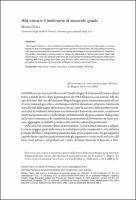Chapter Alla cieca e il testimone di secondo grado
| dc.contributor.author | Pesce, Monica | |
| dc.date.accessioned | 2022-06-01T12:22:54Z | |
| dc.date.available | 2022-06-01T12:22:54Z | |
| dc.date.issued | 2021 | |
| dc.identifier | ONIX_20220601_9788855183383_591 | |
| dc.identifier.issn | 2420-8361 | |
| dc.identifier.uri | https://library.oapen.org/handle/20.500.12657/56406 | |
| dc.description.abstract | The essay focuses on the modalities adopted by Magris in his novel, Alla cieca, to merge literature and civil engagement through a fine narrative construction. By populating his writing with precise documentary research and taking advantage of the possibilities of invention, the author succeeds in giving voice to minimum destinies of History and save their high moral lesson. This can also be seen through a comparative reading of the pages of the novel dealing with Tito’s gulag, Goli Otok, and Scotti’s book, which is a historical reconstruction provided by witnesses of the events suffered by Italians who lived there. | |
| dc.language | Italian | |
| dc.relation.ispartofseries | Biblioteca di Studi di Filologia Moderna | |
| dc.subject.other | Alla cieca | |
| dc.subject.other | Fiction | |
| dc.subject.other | Goli Otok | |
| dc.subject.other | Magris | |
| dc.subject.other | Witness | |
| dc.title | Chapter Alla cieca e il testimone di secondo grado | |
| dc.type | chapter | |
| oapen.identifier.doi | 10.36253/978-88-5518-338-3.26 | |
| oapen.relation.isPublishedBy | bf65d21a-78e5-4ba2-983a-dbfa90962870 | |
| oapen.relation.isbn | 9788855183383 | |
| oapen.series.number | 59 | |
| oapen.pages | 19 | |
| oapen.place.publication | Florence |

